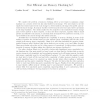Free Online Productivity Tools
i2Speak
i2Symbol
i2OCR
iTex2Img
iWeb2Print
iWeb2Shot
i2Type
iPdf2Split
iPdf2Merge
i2Bopomofo
i2Arabic
i2Style
i2Image
i2PDF
iLatex2Rtf
Sci2ools
128
click to vote
TCC
2009
Springer
2009
Springer
How Efficient Can Memory Checking Be?
We consider the problem of memory checking, where a user wants to maintain a large database on a remote server but has only limited local storage. The user wants to use the small (but trusted and secret) local storage to detect faults in the large (but public and untrusted) remote storage. A memory checker receives from the user store and retrieve operations to the large database. The checker makes its own requests to the (untrusted) remote storage and receives answers to these requests. It then uses these responses, together with its small private and reliable local memory, to ascertain that all requests were answered correctly, or to report faults in the remote storage (the public memory). A fruitful line of research investigates the complexity of memory checking in terms of the number of queries the checker issues per user request (query complexity) and the size of the reliable local memory (space complexity). Blum et al., who first formalized the question, distinguished between on...
Cryptography | Logarithmic Query Complexity | Online Memory Checkers | Query Complexity | TCC 2009 |
Related Content
| Added | 25 Nov 2009 |
| Updated | 25 Nov 2009 |
| Type | Conference |
| Year | 2009 |
| Where | TCC |
| Authors | Cynthia Dwork, Moni Naor, Guy N. Rothblum, Vinod Vaikuntanathan |
Comments (0)

